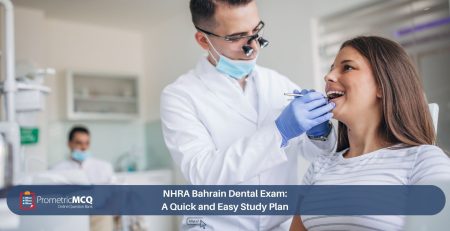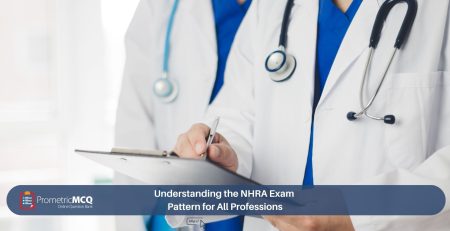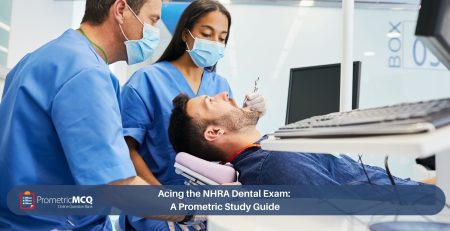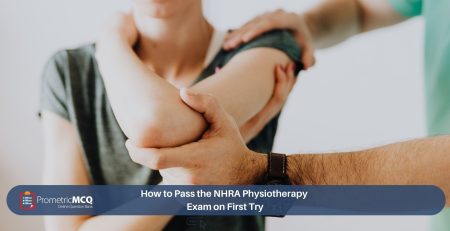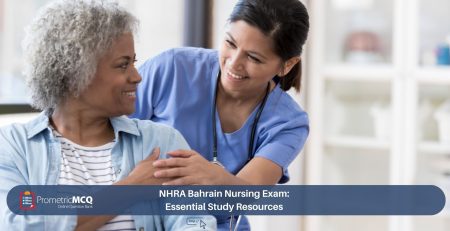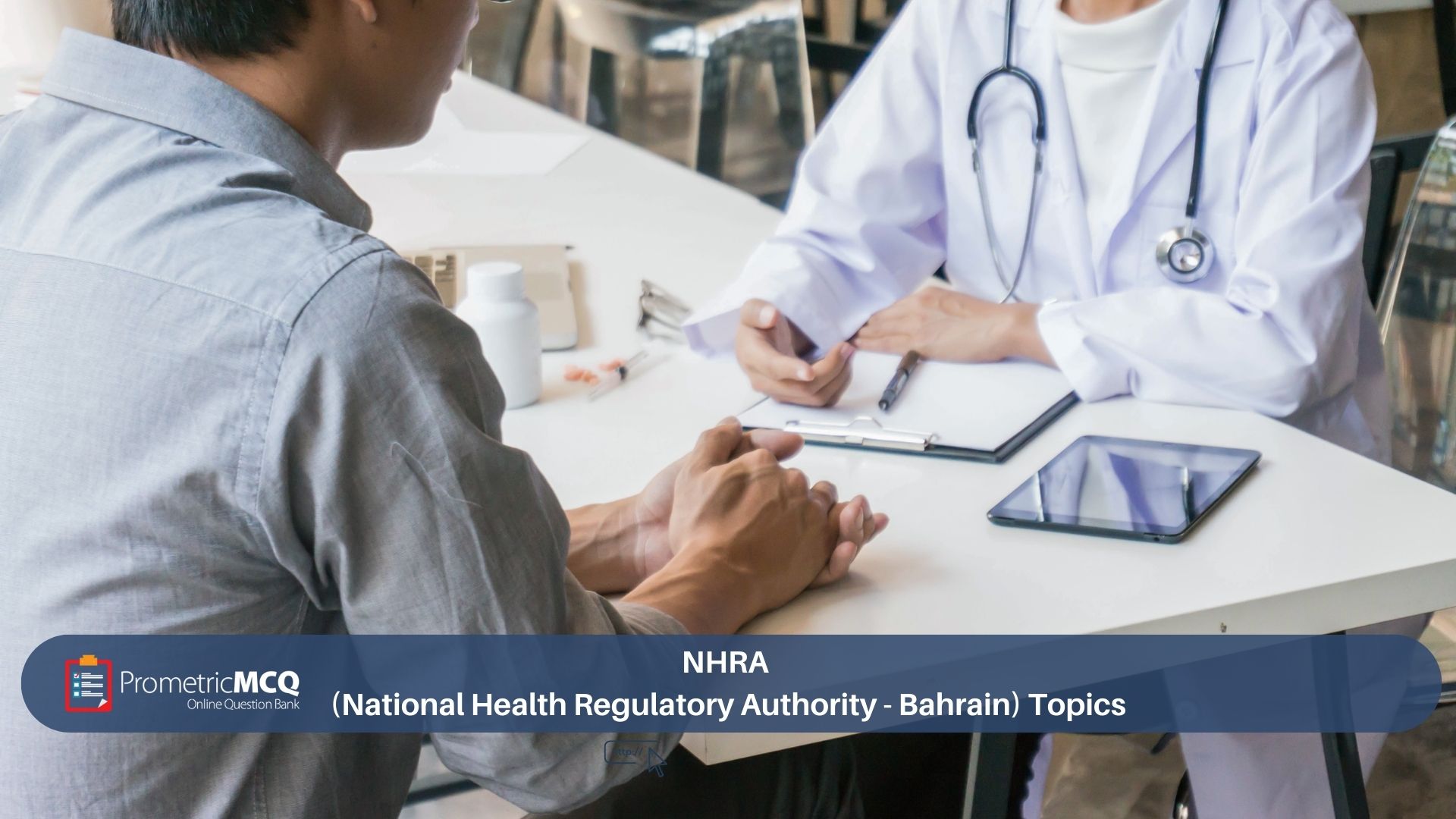
NHRA (National Health Regulatory Authority – Bahrain) Topics
fatima@prometricmcq.com2025-09-17T21:37:02+00:00Table of Contents
ToggleNHRA Bahrain Exam Topics: A Comprehensive 2025 Guide
The Kingdom of Bahrain, with its rapidly advancing healthcare infrastructure and commitment to international standards of excellence, has become a prime destination for medical professionals across the globe. At the heart of this system is the National Health Regulatory Authority (NHRA), the body responsible for ensuring the quality and safety of healthcare services. For any doctor, nurse, pharmacist, or allied health professional aspiring to practice in Bahrain, clearing the NHRA licensure examination is the mandatory and most critical step.
This exam is not a mere formality; it is a comprehensive assessment designed to verify that candidates possess the clinical competence, up-to-date knowledge, and sound judgment necessary to practice safely and effectively. Unlike purely academic tests, the NHRA exam is deeply rooted in clinical application, presenting candidates with real-world scenarios that demand critical thinking and decisive action. Success is not achieved through rote memorization, but through a strategic and deep understanding of the core topics relevant to your specialty.
This ultimate guide has been created to be your definitive roadmap to the NHRA exam. We will meticulously break down the high-yield topics for all major healthcare professions, providing a clear blueprint for your studies. We’ll explore the exam’s structure, offer sample questions with detailed, expert rationales, and lay out a winning study strategy. Complemented by a thorough 10-point FAQ section, this guide aims to eliminate uncertainty and equip you with the knowledge and confidence needed to master the NHRA exam.
Key Takeaways for NHRA Exam Success
- Clinical Focus is Key: The NHRA exam is overwhelmingly case-based. Your ability to diagnose, manage, and treat patients in clinical scenarios is paramount.
- International Guidelines Prevail: The exam is based on globally recognized best practices (e.g., AHA, ADA, GINA guidelines). Ensure your knowledge is current.
- Patient Safety is the Core Theme: Questions will constantly test your understanding of patient safety principles, from medication administration to infection control and ethical conduct.
- Know Your Scope of Practice: The exam for each profession is tailored to its specific scope. Understand what is expected of a general practitioner vs. a specialist, or a registered nurse vs. a lab technician.
- Strategic MCQ Practice is Essential: The most effective way to prepare is with a high-quality question bank. Our guide to Bahrain NHRA Exam Preparation is the perfect place to start.
Deconstructing the NHRA Exam: A Multi-Disciplinary Blueprint
The NHRA exam is a computer-based test (CBT) administered by Prometric. The number of questions and the duration vary by specialty, but the underlying principle is a comprehensive evaluation of professional competence. A successful study plan requires a deep dive into the specific topics for your profession.
1. NHRA Exam Topics for Physicians (General Practitioners & Specialists)
The exam for doctors is clinically rigorous, focusing on the most common and high-impact conditions seen in practice.
- Internal Medicine: This is the largest component. Expect in-depth questions on Cardiology (Ischemic Heart Disease, Hypertension, Heart Failure), Endocrinology (Diabetes Mellitus management, thyroid disorders), Pulmonology (Asthma, COPD), Gastroenterology (PUD, GERD, IBD), and Infectious Diseases.
- Pediatrics: Focus on developmental milestones, common infectious diseases of childhood (e.g., croup, bronchiolitis), immunization schedules, and management of pediatric emergencies like dehydration and febrile seizures.
- Obstetrics & Gynecology: Key topics include routine antenatal care, management of common pregnancy complications (e.g., pre-eclampsia, gestational diabetes), labor and delivery, and common gynecological issues like abnormal uterine bleeding and PCOS.
- General Surgery: Emphasis on the assessment and initial management of the acute abdomen (e.g., appendicitis, cholecystitis), principles of trauma care (ATLS), and pre- and post-operative management.
- Emergency Medicine & Ethics: Management of common emergencies, basics of EKG interpretation, and a strong understanding of medical ethics, patient consent, and confidentiality are woven throughout the exam.
2. NHRA Exam Topics for Nurses
The nursing exam centers on the application of the nursing process, prioritization, and patient safety.
- Fundamentals of Nursing: The nursing process (ADPIE), legal and ethical responsibilities, documentation, vital signs interpretation, and fluid and electrolyte balance.
- Medical-Surgical Nursing: This is the core of the exam. You must know the nursing management of adult patients with cardiovascular, respiratory, endocrine, neurological, and GI disorders. Post-operative care, wound management, and pain management are high-yield topics.
- Pharmacology: A critical section. Focus on medication safety (the “10 Rights”), major drug classifications, common side effects, and, most importantly, flawless drug dosage calculations (oral, IV, and drip rates).
- Patient Safety & Infection Control: Standard, contact, droplet, and airborne precautions; fall prevention strategies; and recognizing and responding to deteriorating patient conditions.
- Prioritization & Delegation: Scenario-based questions will ask you to identify which patient to see first (using ABCs, Maslow’s hierarchy) and which tasks can be safely delegated to junior staff.
3. NHRA Exam Topics for Dentists
The dental exam assesses the full scope of a general dental practitioner’s skills.
- Diagnosis and Treatment Planning: This is a major theme. You will be given clinical scenarios with patient history, images, and radiographs and asked for the most likely diagnosis and the most appropriate treatment plan.
- Operative Dentistry: Principles of cavity preparation, properties and manipulation of dental materials (composites, amalgams, glass ionomers), and cariology.
- Endodontics: Diagnosis of pulpal and periapical diseases, root canal procedures, and management of dental trauma.
- Oral Surgery: Simple and surgical extractions, local anesthesia (techniques, pharmacology, complications), and management of common post-operative complications.
- Periodontics & Oral Medicine: Diagnosis and management of periodontal diseases, identification of common oral lesions, and understanding oral manifestations of systemic diseases.
4. NHRA Exam Topics for Pharmacists
The pharmacy exam tests both clinical knowledge and the practical aspects of pharmacy operations.
- Clinical Pharmacy & Therapeutics: Similar to the physician’s exam, this is the largest domain, focusing on the pharmacotherapy of common disease states. You must be an expert in guideline-based drug selection.
- Pharmaceutics & Calculations: This domain includes pharmacokinetics, dosage form design, and a heavy emphasis on all types of pharmaceutical calculations. Accuracy is mandatory.
- Pharmacology & Toxicology: Mechanism of action, side effects, drug interactions, and the management of drug toxicity, including knowledge of common antidotes.
- Pharmacy Operations & Law: Patient counseling, medication dispensing processes, and knowledge of laws and regulations specific to pharmacy practice in Bahrain.
For every clinical topic you study, ask yourself: “How would this present in a patient? What is the first thing I would do? What is the most critical safety consideration?” This will shift your mindset from academic recall to clinical application.
NHRA Exam Sample Questions with In-Depth Rationales
Engaging with high-quality MCQs is the best way to prepare. The following examples reflect the case-based nature of the NHRA exams. For comprehensive practice, use a dedicated MCQ Package tailored to your specialty.
Sample Question 1: Physician (GP)
A 60-year-old male with a history of hypertension and type 2 diabetes presents with sudden-onset severe tearing chest pain that radiates to his back between the scapulae. His blood pressure is 180/110 mmHg in the right arm and 140/90 mmHg in the left arm. A chest X-ray reveals a widened mediastinum. What is the most likely diagnosis?
- Acute Myocardial Infarction
- Pulmonary Embolism
- Aortic Dissection
- Pericarditis
Correct Answer: C
Rationale: This is a classic presentation of an acute aortic dissection. The sudden, severe “tearing” or “ripping” pain radiating to the back is a hallmark symptom. The blood pressure discrepancy of >20 mmHg between the arms is a highly specific physical exam finding caused by the dissection flap compromising blood flow to one of the subclavian arteries. A widened mediastinum on chest X-ray further supports this life-threatening diagnosis.
Why other options are incorrect:
A: An MI typically presents with crushing, pressure-like pain and would show EKG changes, not a BP discrepancy or widened mediastinum.
B: A pulmonary embolism presents with pleuritic chest pain and shortness of breath.
D: Pericarditis presents with sharp, pleuritic pain that is often relieved by leaning forward.
Sample Question 2: Nurse
A nurse is caring for a patient with severe COPD who is experiencing an acute exacerbation. The patient is anxious and has a respiratory rate of 32 breaths/min. The physician orders oxygen. Which oxygen delivery method is most appropriate for this patient?
- Simple face mask at 10 L/min
- Non-rebreather mask at 15 L/min
- Venturi mask at 24% FiO2
- Nasal cannula at 6 L/min
Correct Answer: C
Rationale: Patients with chronic COPD may have a hypoxic drive to breathe, meaning high concentrations of oxygen can depress their respiratory drive. A Venturi mask is the most precise oxygen delivery device, allowing the nurse to deliver a specific, low concentration of oxygen (FiO2), such as 24% or 28%. This provides the necessary oxygen without the risk of blunting the respiratory drive. It is the safest and most appropriate choice for this patient population.
Why other options are incorrect:
A, B, D: These are all high-flow or variable-concentration devices that deliver a much higher and less precise FiO2, which could be dangerous for a patient with CO2 retention.
Frequently Asked Questions (FAQs) for the NHRA Bahrain Exam
The NHRA exam is graded as Pass/Fail. While an official percentage is not published, the widely accepted passing threshold for most specialties is around 60-65%. To ensure success, it is strongly recommended that you consistently score above 70% in high-quality mock exams.
The first step is to check your eligibility and begin the credentialing process through the NHRA’s online portal. This involves submitting your educational and professional documents for Primary Source Verification (PSV) via the DataFlow Group. Once your credentials are verified and approved, you will be issued an eligibility number to book your exam.
The timeline can vary significantly depending on the responsiveness of your educational institutions and previous employers. On average, the DataFlow PSV process for the NHRA can take anywhere from 4 weeks to 3 months. It is advisable to start this process well in advance.
Yes, there is a significant overlap. All major Gulf health authorities (NHRA, DHA, MOH, SCFHS) base their exams on international standards of care. The core clinical knowledge required is very similar. The main differences might be in the specific focus on local laws and regulations, which are generally a minor part of the overall exam.
Typically, candidates are allowed a total of three attempts to pass the NHRA licensure exam. If you are unsuccessful after three attempts, you may be required to undertake additional training or gain more experience before you are permitted to re-apply. Always check the latest regulations on the official NHRA website.
The single most reliable source of information is the official National Health Regulatory Authority (NHRA) of Bahrain website. You can find licensing requirements, regulations, and official circulars at www.nhra.bh/en/.
Yes, a recent Certificate of Good Standing from the medical licensing authority of the country where you last practiced is a mandatory document for the application process. The CGS is typically valid for 3 to 6 months from the date of issue, so you must time your application accordingly.
While standard textbooks for your specialty provide the necessary foundation, the most effective preparation tool is a comprehensive question bank (QBank) with thousands of MCQs. This allows you to practice the application of knowledge in a format that mirrors the real exam. Our platform offers dedicated NHRA exam preparation materials to help you succeed.
No, there is no penalty or negative marking for incorrect answers on the NHRA Prometric exams. It is always in your best interest to answer every single question, even if you have to make an educated guess.
You must bring your original, valid passport. The name on your passport must exactly match the name you used to register for the exam. No other form of ID is typically accepted. The Prometric test center will provide a locker for your personal belongings and all necessary materials for the test.
Conclusion: Your Gateway to a Career in Bahrain
The NHRA licensure examination is a rigorous standard-bearer, ensuring that the Kingdom of Bahrain’s healthcare system is staffed by professionals of the highest caliber. It is a challenging but surmountable step in your professional journey. A successful outcome is not a matter of chance; it is the product of a well-structured preparation plan, a deep understanding of core clinical topics, and a relentless focus on applying your knowledge through practice. By using this guide to structure your studies, you can approach the exam with the confidence and competence needed to achieve a passing score and begin a rewarding career in Bahrain.
Ready to Begin Your NHRA Exam Preparation?
Our premium question banks for all NHRA specializations are designed to simulate the real exam, with thousands of high-yield questions, detailed rationales, and performance tracking to guarantee your success.

